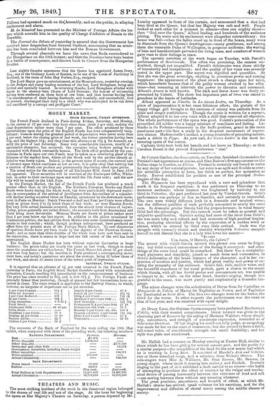THEATRES AND MUSIC.
The most striking incident of the week in the theatrical region belonged to the drama of real life and not of the stage. At the hour for beginning the opera at Her Majesty's Theatre on Saturday, a person deputed by Mr. Lumley appeared in front of the curtain, and announced that a shot had been fired at the Queen, but that her Majesty was safe and well. People looked at each other for a moment in silence—then one mighty shout— then "God save the Queen," Alboni leading, and hundreds of the audience joining. The scene and its excitement were altogether extraordinary: the house was full—when the ladies stood up in front of the boxes, many were in diamonds from the Queen's drawingroom—many gentlemen, and among them the venerable Duke of Wellington, in gorgeous uniforms; the waving of hats and handkerchiefs pervaded the living mass, and numbers of women gave vent to their feelings in tears.
The operatic novelties of the week began on Tuesday, with Parodi's performance of Senaramide. The effort was promising, the success un- doubted, though not unqualified. Parodi's deficiencies were those chiefly of immaturity and inexperience; and the quality of her voice was severely tested in the upper part. Her aspect was dignified and queerdike. At first she was the great sovereign, exulting in conscious power and coming happiness: the appearance of the ghost struck a change upon her mien, which henceforth became that of the guilty woman crushed in her affee - tions—but resuming at intervals the power to threaten and- command. Albonrs Arsace is well known. The dark and fierce Assur was finely re- presented by Coletti. The short but important part of Oroe was raised to grandeur in the hands of Lablache.
Alboni appeared as Ninetta, in La Gazza Ladra, on Thursday. As a piece of impersonation it is her most felicitous effort; the picture of the happy village girl brought to the extreme of misery was pathetic from its plain and simple truthfulness. Though the music is written for a soprano, Alboni adapted it to her own voice with a skill that removed all objection. The whole performance of the opera was good. Coletti's personation of the proscribed old soldier was a happy mixture of manliness and feeling. La- bla.che is the Podesta—humorous in the buffo portions, grand in the more passionate part—his face a study in the eloquent movements of expres- sive silence. Mademoiselle Casolani, a young contralto of promising talents, made a debat in Pippo. As ,now cast, La Gazza Ladra is tho most in- teresting opera of the season.
Carlotta Grisi took both her benefit and her leave On Thursday; so that Carolina Rosati is the present Terpsichorean "star."


























 Previous page
Previous page